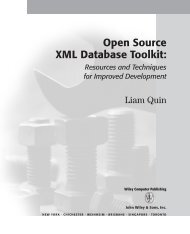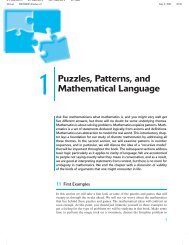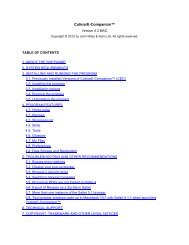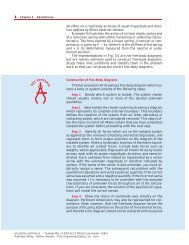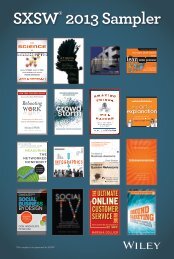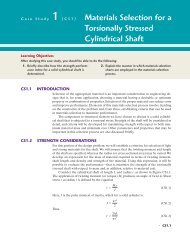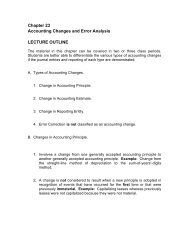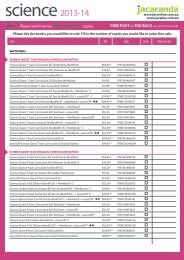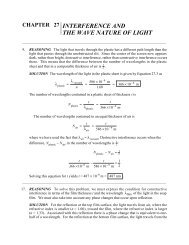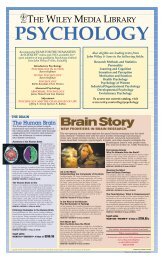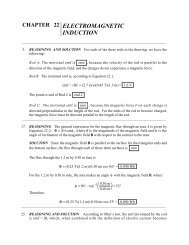Chapter Two - Wiley
Chapter Two - Wiley
Chapter Two - Wiley
Create successful ePaper yourself
Turn your PDF publications into a flip-book with our unique Google optimized e-Paper software.
8956d_ch02.qxd 7/17/03 2:40 PM Page 54 mac34 Mac34: kec_420:<br />
54 CHAPTER 2 A Further Look at Financial Statements<br />
determined by standard-setting bodies in consultation with the accounting profession<br />
and the business community.<br />
The Securities and Exchange Commission (SEC) is the agency of the U.S.<br />
government that oversees U.S. financial markets and accounting standard-setting<br />
bodies. The primary accounting standard-setting body in the United States is the<br />
Financial Accounting Standards Board (FASB). The FASB’s overriding criterion<br />
is that the accounting rules should generate the most useful financial<br />
information for making business decisions. To be useful, information should<br />
possess these qualitative characteristics: relevance, reliability, comparability, and<br />
consistency.<br />
Business Insight<br />
INVESTOR PERSPECTIVE<br />
In the aftermath of Enron, much attention has turned toward the Securities and<br />
Exchange Commission (SEC). In 2000, companies filed 98,000 reports with the<br />
SEC, 14,000 of which were annual reports. But budget shortfalls and staffing<br />
limitations meant that the SEC was able to review only 2,280 of these annual<br />
reports. As a result of SEC reviews, companies are often required to improve the<br />
disclosures in their annual report. Enron’s report had not been reviewed since<br />
1997.<br />
STUDY OBJECTIVE<br />
2<br />
Discuss the qualitative<br />
characteristics of<br />
accounting information.<br />
RELEVANCE<br />
Information of any sort is relevant if it would influence a decision. Accounting<br />
information is relevant if it would make a difference in a business decision. For<br />
example, when Best Buy issues financial statements, the information in the<br />
statements is considered relevant because it provides a basis for forecasting Best<br />
Buy’s future earnings. Accounting information is also relevant to business decisions<br />
because it confirms or corrects prior expectations. Thus, Best Buy’s financial<br />
statements help predict future events and provide feedback about prior<br />
expectations for the financial health of the company.<br />
In addition, for accounting information to be relevant it must be timely.<br />
That is, it must be available to decision makers before it loses its capacity to influence<br />
decisions. In order to increase the timeliness of financial reports, the<br />
SEC recently required that companies provide their annual report to investors<br />
within 60 days of their year-end. They had previously been allowed up to 90 days.<br />
RELIABILITY<br />
Reliability of information means that the information can be depended on. To<br />
be reliable, accounting information must be verifiable—we must be able to prove<br />
that it is free of error. Also, the information must be a faithful representation<br />
of what it purports to be—it must be factual. If Best Buy’s income statement<br />
reports sales of $20 billion when it actually had sales of $10 billion, then the<br />
statement is not a faithful representation of Best Buy’s financial performance.<br />
Finally, accounting information must be neutral—it cannot be selected, prepared,<br />
or presented to favor one set of interested users over another. As noted<br />
in <strong>Chapter</strong> 1, to ensure reliability, certified public accountants audit financial<br />
statements.



